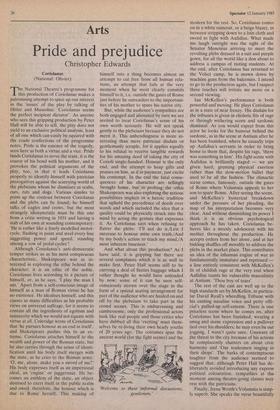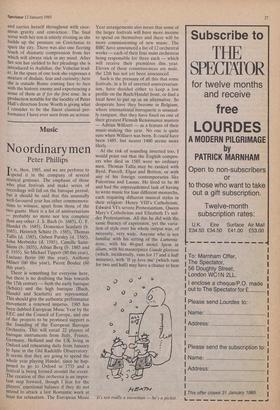Arts
Pride and prejudice
Christopher Edwards
Coriolanus (National: Olivier)
The National Theatre's programme for this production of Coriolanus makes a patronising attempt to spice up our interest in the 'issues' of the play by talking of Hitler and Mussolini: 'Coriolanus seems the perfect incipient dictator'. As anyone who sees this gripping production by Peter Hall will be able to tell, the play does not yield to an exclusive political analysis, least of all one which can easily be squared with the crude confections of the programme notes. Pride is the essence of the tragedy, seen here as both a virtue and a vice. Pride binds Coriolanus to serve the state, it is the source of his bond with his mother, and it provokes the political arguments of the play, too, in that it leads Coriolanus properly to identify himself with patrician prerogatives against the scurrying world of the plebeians whom he dismisses as scabs, curs, rats and dogs. Various similes to point up the contrast between Coriolanus and the plebs can be found; he himself talks of eagles and crows, but the most strangely idiosyncratic must be this one from a critic writing in 1931 and having a stab of his own at sounding contemporary: 'He is rather like a finely modelled motor- cycle, flashing in paint and steel every line suggesting power and speed, standing among a row of pedal-cycles'!
Although Coriolan us's anti-democratic temper strikes us as his most conspicuous characteristic, Shakespeare was as in- terested in exploring the ethic behind the character; it is an ethic of the noble. Coriolanus lives according to a picture of himself, or, as he says, 'I play the man I am.' Apart from a self-conscious image of himself as a man of Roman virtue he has no existence. He idealises himself, and this causes as many difficulties as his probable views on universal suffrage, for it seems to contain all the ingredients of egotism and insincerity which we would not equate with virtue at all. Coleridge wrote of Coriolanus that 'he pursues honour as an end in itself, and Shakespeare pushes this to an ex- treme. Coriolanus attaches himself to the wealth and power of the Roman state, but he also carries through the sense of identi- fication until his body itself merges with the state, as he cries to the Roman army: '0, me, alone, make you a sword of me?' His body expresses itself as an impersonal ideal, an 'engine' or juggernaut. He be- comes an emblem of the state, an object destined to exert itself in the public realm and owed, therefore, the honour which is due to Rome herself. This making of himself into a thing becomes almost an attempt to cut free from all human rela- tions, an attempt that fails at the very moment when he most clearly commits himself to it, i.e. outside the gates of Rome just before he surrenders to the importuni- ties of his mother to spare his native city.
But, while the audience's sympathies are both engaged and alienated by turn we are invited to treat Coriolanus's sense of his own worth seriously. He will not speak gently to the plebeians because they do not merit it. This unbendingness is more in- teresting than mere patrician disdain or gentlemanly scruple, for it applies equally to his refusal to receive tangible rewards for his amazing deed of taking the city of Corioli single-handed. Honour is the only end, and the attempt to heap gifts and praises on him, as if in payment, just excite his contempt. In the end the fatal conse- quences of his character are tellingly brought home, but in probing the ethic Shakespeare was also exploring the serious possibilities implicit in a heroic tradition that upheld the precedence of deeds over words and which included the idea that a quality could be physically struck into the mind by acting the gesture that expresses it. As Coriolanus says when refusing to flatter the plebs: 'I'll not do it,/Lest I surcease to honour mine own truth,/And by my body's action to teach my mind,/A most inherent baseness.'
And what about this production? As I have said, it is gripping but there are several complaints which it is as well to make first. Peter Hall seems still to be carrying a deal of Sixties baggage which I rather thought he would have unloaded by now; some of it can be seen self- consciously strewn over the stage in the form of a special seating arrangement for part of the audience who are hauled on and off by the plebeians to take part in the crowd scenes. This is embarrassing and cumbersome; only the professional actors look like real people and those critics who have dubbed all this 'exciting' must them- selves be re-living their own heady youths of 20 years ago. The costumes span the ancient world (for the fight scenes) and the 'Welcome to these informal discussions, gentlemen.' modern for the rest. So, Coriolanus comes on in a white raincoat, or a beige blazer, in between stripping down to a loin cloth and sword to fight with Aufidius. What made me laugh outright was the sight of the Senator Menethus arriving to meet the revolting plebs dressed in a suit and purple gown, for all the world like a don about to address a campus of rioting students. At the end, after Coriolanus has returned to the Volsci camp, he is mown down by machine guns from the balconies. I intend to go to the production again, but I suspect these touches will irritate me more on a second viewing.
Ian McKellen's performance is both powerful and moving. He plays Coriolanus as in a state of near frenzy. His disdain for the tribunes is given in choleric fits of rage or through withering scorn and sardonic dismissal. As you would expep from this actor he looks for the humour behind the sardonic, as in the scene at Antium after he has been banished, where he casually trips up Aufidius's servants in order to bring home to them that, despite his rags, 'there was something in him'. His fight scene with Aufidius is brilliantly staged — we are given hard, grunting physical exertion rather than the slow-motion ballet that used to' be all the fashion. The climactic scene comes, famously, outside the gates of Rome where Volumnia appeals to her son to spare Rome. After seeing the scene, and McKellen's hysterical breakdown under the pressure of her pleading, the map of his interpretation becomes very clear. And without diminishing its power I think it is an obvious psychological approach he has taken. Coriolanus be- haves like a moody adolescent with his mother throughout the production. He accepts orders from her alone, and at her bidding shuffles off moodily to address the plebs in the market place. This contributes an idea of the inhuman engine of war as fundamentally immature and repressed — a line entirely consistent with McKellen's fit of childish rage at the very end when Aufidius taunts his vulnerable masculinity at Antium: 'Thou boy of tears'.
The rest of the cast are well up to the high standards set by McKellen, in particu- lar David Ryall's wheedling Tribune with his canting nasaline voice and petty offi- cial's puffed-up self-esteem. There is one priceless scene where he comes on, after Coriolanus has been banished, wearing a smug and inane expression and a pullover tied over his shoulders; he may even be out jogging, I wasn't quite sure. Unaware of Ihe threat to the city because of his actions he complacently chatters on about civic harmony and 'Our tradesmen singing in their shops'. The barks of contemptuous laughter from the audience seemed to suggest that, although Peter Hall has de- liberately avoided introducing any express political colouration, sympathies at the. moment among theatre-going classes may rest with the patricians.
Finally, Irene Worth's Volumnia is simp- ly superb. She speaks the verse beautifully
and carries herself throughout with enor- mous gravity and conviction. The final scene with her son is utterly riveting as she builds up the pressure on Coriolanus to spare the city. There was also one fleeting touch of dramatic compression from her Which will always stick in my mind. After her son has yielded to her pleadings she is introduced to Aufidius, the Volscian lead- er. In the space of one look she expresses a mixture of disdain, fear and curiosity; here she is outside Rome coming face to face With the historic enemy and experiencing a sense of them as if for the first time. In a production notable for the lucidity of Peter Hall's direction Irene Worth is giving what I consider to be the finest classical per- formance I have ever seen from an actress.







































 Previous page
Previous page